|
Home Page
Known About Fluoride
Toothpaste Warning
Interferes with Brain
Fetal Vulnerability
Neurotoxicity
Needs to Be Known
Fetal Fluoride Intake
Fluoride Drugs
Amniotic Fluid
Bogus Sales Pitch
Oregon Deception
King Fluoride
Crazy Advice
Premature Birth
Infants Overdosed
Infant Mortality
Life Decay
Mental Fluorosis
Fluoride and
Neurodegeneration
End Fluoridation
Save $Billions
Know News
Prenatal Microbiome
Fluoride & Obesity
Vascular Dementia
Arterial Stiffness
2019 Studies
Fluoridation 'Science'
CDC's Irrationale
EPA's Pollutant
PHS's Debunkery
The Book
Contents
Author
|
2007 Oregon Smile Survey Cover Up
Water fluoridation and tooth decay rates both increased over 5 years,
but the Oregon dental establishment concealed this fact.
|
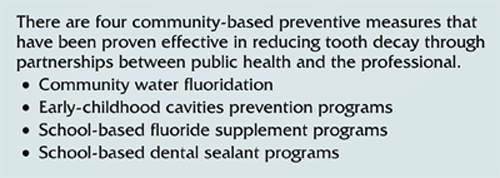
With such a fervent belief that fluoridation is the top preventive measure proven effective in reducing tooth decay, it's no wonder Oregon's dental establishment did not mention fluoridation stats in their otherwise comprehensive 2007 Oregon Smile Survey:
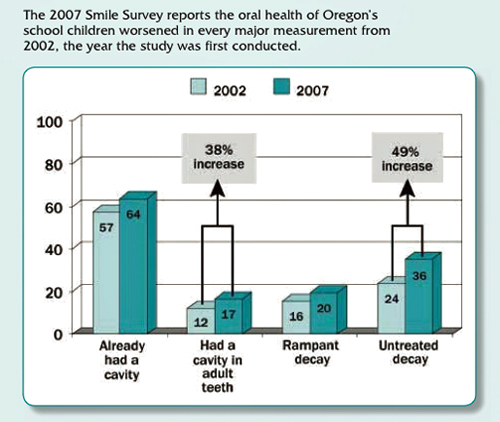
As stated in their Executive Summary:
The results of the study were "sobering."
More like "criminal," when fluoridation stats are revealed:
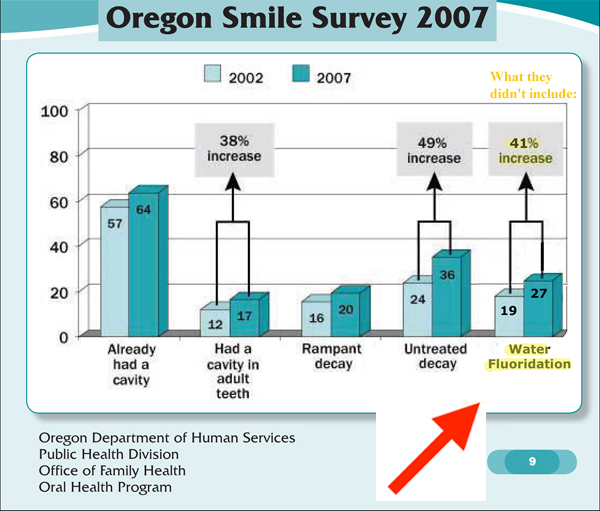
With a 41% increase in fluoridation, "Oregon's
school children worsened in every major measurement":
- Already had a cavity (12%)
- Had a cavity in adult teeth (38%)
- Rampant decay (25%)
- Untreated tooth decay (49%)
|
This is evidence of a false sense of safety resulting from the dental establishment's incessant insistence that fluoridated water is a top-10 public health achievement (page 18):
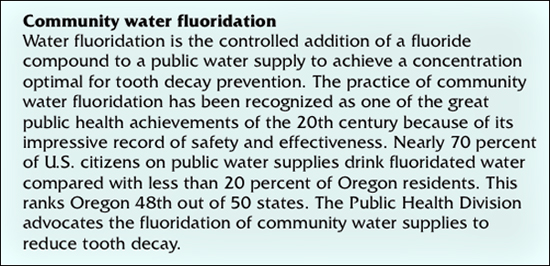
2017: the Oregon dental establishment again concealed the fact that
less fluoridation is associated with less tooth decay.
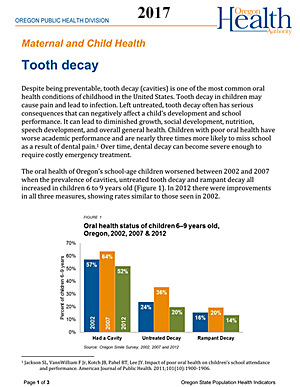
Their misinformation is here corrected:
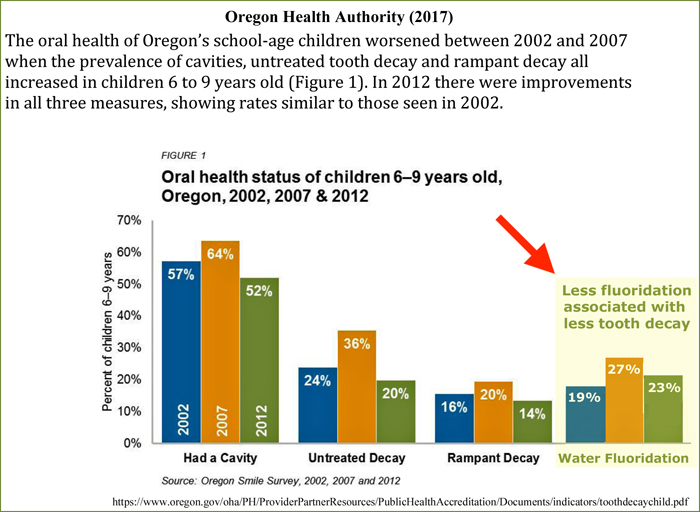
Something else the 2007 survey revealed (page 16): unfluoridated Portland
had half the rate of untreated tooth decay than the rest of Oregon:
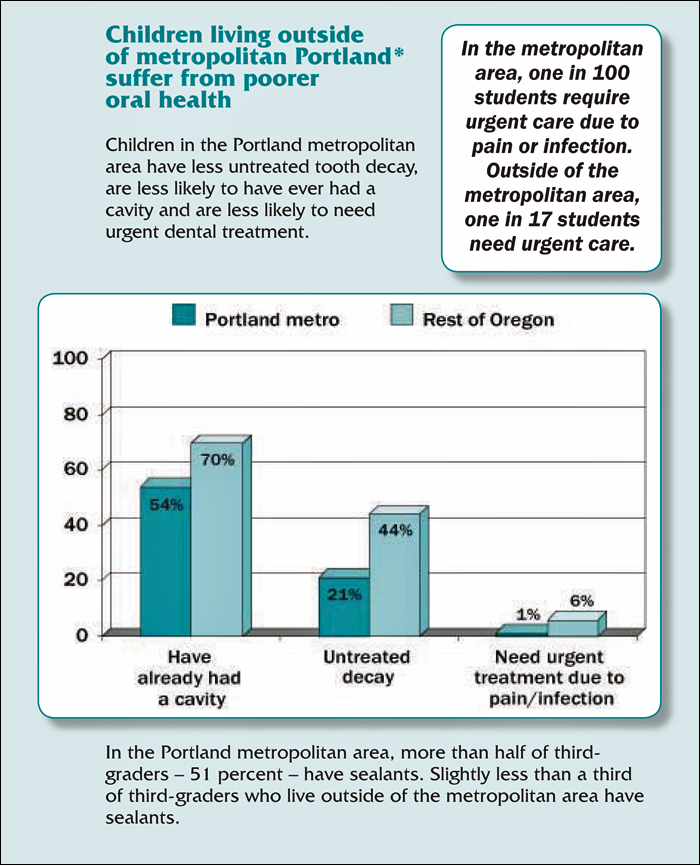
Better Oral Health in Unfluoridated Portland
(and How They Spun It)
"Children in the Portland metropolitan area have less untreated tooth decay, are less likely to have ever had a cavity and are less likely to need urgent dental treatment." – Oregon Department of Human Services (DHS)
DHS and the Associated Press coverage failed to mention that Portland's drinking water was not fluoridated.
In contrast, a pro-fluoridation newspaper did say that "Portland is the largest city in the United States that does not fluoridate its water," but failed to mention that Portland had better oral health, even though the editors used the survey to validate their belief that "were fluoridation more widespread in Oregon, the 2007 Oregon Smile Survey might actually contain something to smile about." (Require Fluoridation, Bend Bulletin, 20 Nov 2007)
Citing Oregon's worsening dental health (not mentioning that it's worsening nationwide), the editors question whether Oregon is "really part of a developed, first-world country" and calling it a "population of public-health Luddites," because Oregon is one of the least fluoridated states. (Fluoridate Already, 25 Apr 2008)
If that editorial board thinks Oregonians are public-health Luddites, then they must think Swedes are downright Neanderthals, because Sweden outlawed water fluoridation in 1980, thanks in large part to Dr. Arvid Carlsson. This winner of the 2000 Nobel Prize in Medicine said water fluoridation is an obsolete practice that's "against all principles of modern pharmacology."
Conspicuously absent from the Oregon 2007 Smile Survey was any evidence of the centerpiece of the fluoridation sales pitch. No reduction in kids' cavities were reported for artificially fluoridated Salem, Beaverton, or Corvallis.
Also missing was evidence of less tooth decay in children living in any of Oregon's 35 communities whose water systems have levels of natural (calcium) fluoride considered optimal for protecting teeth.
What Oregon's Smile Survey did reveal was that low-income children and those without dental insurance had poorer oral health and less access to care. This is the same (and worsening) situation across the nation.
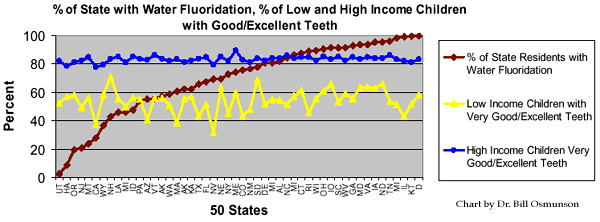
Chart prepared by Dr. Bill Osmunson
|
|
2012 Oregon Smile Survey
After Oregon's Fluoride-For-All Lobby (OFFAL) was confronted with this fluoridation reality check, Portland statistics were omitted from the next state survey in 2012. An investigative a journalist, however, compared tooth-decay rates of children living in fluoridated vs. nonfluoridated areas of Oregon.
Again, the data showed unfluoridated students living in the Portland water district had better oral health than fluoridated kids elsewhere in the state.
– Bailey-Shah S. Before you vote: Fluoride and kids' teeth – what does the data show? (KATU News, April 26, 2013)
|
"King" Fluoride
Despite the 2007 Oregon Smile Survey's findings that show water fluoridation was ineffective at reducing tooth decay, Oregon DHS is determined that every man, woman, child, and fetus consume fluoride via drinking water or supplements.
DHS continued feeding fluoride tablets to tens of thousands of school children – even though the agency's archaic program was ineffective and worse:
"In the event that a child takes more than the recommended
dose of fluoride, call the Poison Control Center."
– Oregon's King Fluoride School-Based Tablet Program
|
Earlier crap from OFFAL:
2000 Oral Health Report Card
Endorsed and Promoted by Surgeon General Satcher
The news release put out by Oregon Health & Science University (OHSU) School of Dentistry regarding the first national Oral Health Report Card began: "Oregon has nothing to smile about" and quickly pointed out the state got the worst grade for having one of America's lowest percentages of fluoridated water. Then came quotes from three dentists calling for mandatory statewide fluoridation. – OHSU dental school hopes poor report card will be a wake-up call.
The press release failed to mention the Report Card showed that Oregon kids had the same or lower cavity rates than kids in 19 other states, 14 of which had higher rates of water fluoridation.
Something else the 2000 Oral Health Report Card revealed: Oregon also got a high grade for the percentage of people 65 and older who had not lost all their natural teeth. Only one state, Hawaii, scored better. And like Oregon, Hawaii also got the worst grade for water fluoridation. But here's how the fluoride pushers spun it, then waved the Surgeon General flag:
"Dr. Bruce Goldberg, director of Oregon's Department of Human Services, outlined the need: 'Among Oregonians over age 60, 18 percent have lost all their teeth to preventable dental disease. Many of the health problems that result from tooth decay and oral disease can be prevented with water fluoridation.'
"Dr. Goldberg echoed other public health leaders, including the U.S. Surgeon General, declaring the overwhelming evidence to support fluoridation: 'Studies show that individuals living in communities with fluoridated water supplies experience a reduction in tooth decay of 18-40 percent*, with no negative health impacts.' "
– "It's time for Oregon to Fluoridate Water," The Oregonian, April 13, 2007
After the national data revealed no correlation between increased water fluoridation and reduced cavities, this first Oral Health Report Card was taken out of circulation, and subsequent report cards no longer even measured kids' cavity rates – the whole rationale for water fluoridation in the first place.
Surgeon General David Satcher still endorsed the 2000 Report Card, saying its "findings support what we found nationally in the surgeon general's report." (USA Today, Oct. 9, 2000) And despite the lack of correlation between fluoridation and tooth decay, a year later Satcher claimed "community water fluoridation has been the cornerstone of caries prevention in the United States" – his often-cited endorsement/sales pitch.
* Why you should not believe the fluoridation sales pitch:
of "25% less tooth decay." It does not equal 25% better oral health.
|
|